Menu
/*Login Text CSS*/
.xoo-el-login-tgr,.xoo-el-reg-tgr, .xoo-el-active, .btn.button.xoo-el-action-btn, .xoo-el-action-sc {
font-size: 17px;
text-transform: uppercase;
font-weight: 500;
font-family: ‘Roboto’, sans-serif!important;
}
/*Login Text CSS*/
.xoo-el-login-tgr,.xoo-el-reg-tgr, .xoo-el-active, .btn.button.xoo-el-action-btn, .xoo-el-action-sc {
font-size: 17px;
text-transform: uppercase;
font-weight: 500;
font-family: ‘Roboto’, sans-serif!important;
}
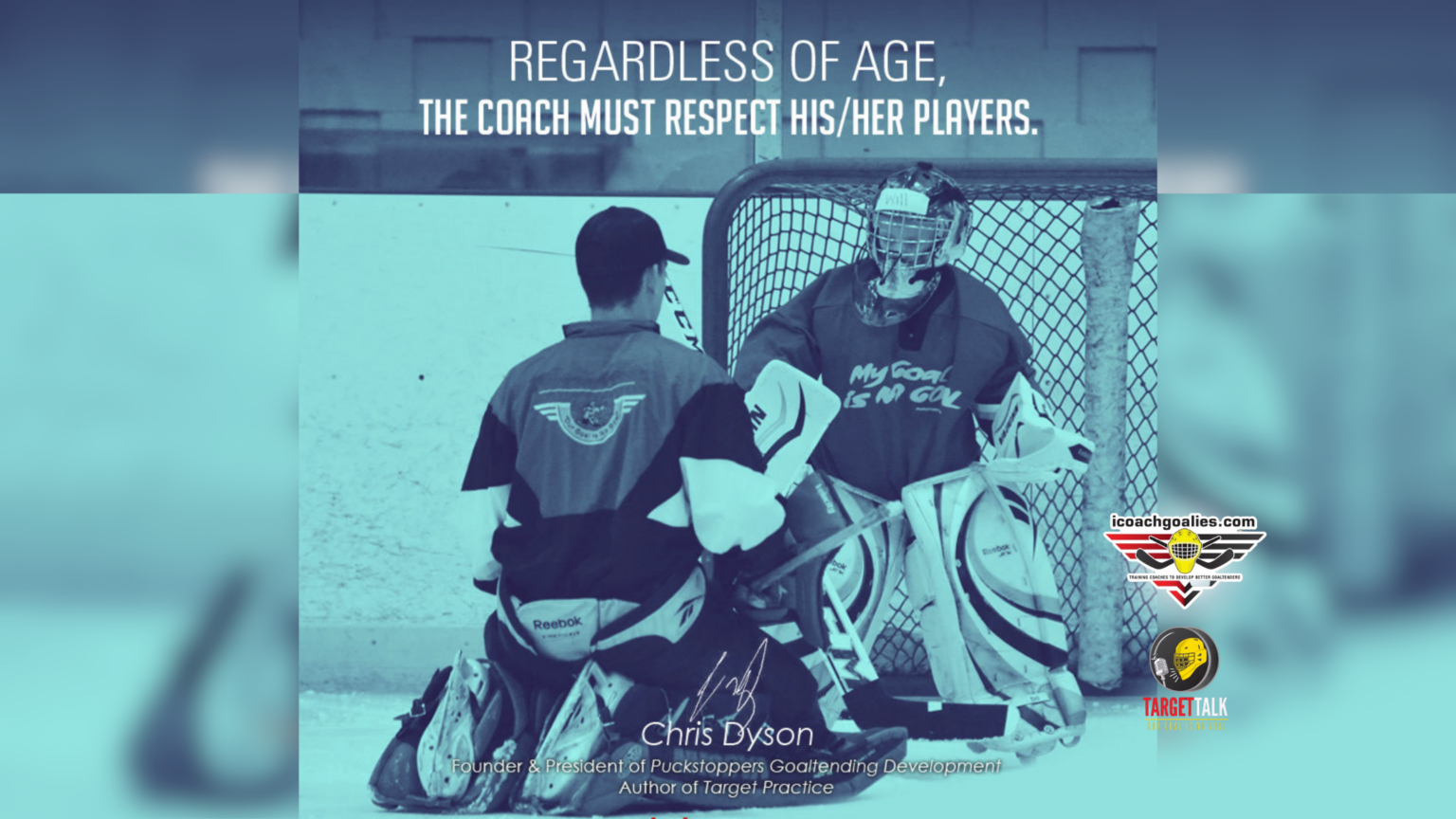

Last week, for what seems like the millionth time, my heart sank for a young goalie who was the victim of a system that puts people in positions without training or the realization that their actions, words, and decisions can have a lifelong effect on the young players they are entrusted to develop, nurture, and help to enjoy the game they play.
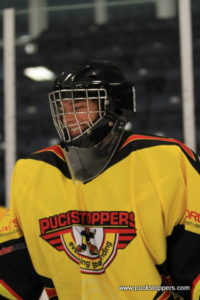
My hope in writing this article is to remind minor hockey administrators and coaches that goalies are people too, with feelings that all too often get forgotten by adults with personal agendas, inflated egos, and delusions of grandeur.
I was contacted for advice by a distraught goalie mom who was upset her 16-year-old son, Spencer Jolley, who played for Westerville (Ohio) in the WWHA, had just walked away from his team.
Let me be very clear. I do not advocate quitting or fading away in the face of a little adversity. The toughest position in any sport requires a strong mindset, very thick skin, and a dedication to your own development, perseverance, and self-esteem.
I have heard literally thousands of sob stories from parents about “their goalie” being benched, picked on, mistreated by the coach, or not played regularly. The list of complaints is endless – and often completely misguided.
A great majority of these frivolous complaints are relayed by overprotective helicopter parents who do not understand that life needs to happen to foster maturity in children.
They usually have no understanding about the dynamics of sport, the role of the coach, or how emotional and physical development are spurred through coaching.
However, there are a great many instances when goalies and parents are completely justified in their concerns, and goalies are victimized far often than any other position in sports.
The story I was told over the last few weeks surrounding Spencer’s experiences was one of an egotistical coach who had just successfully taken away one the great passions in this young man’s life.
I have heard the same story (legitimately) time and time again, and the details are as painful to hear every time. I feel sick to my stomach each time a child is forced from the game because someone thought that the team record or his or her personal status was more important than the kids on the team.
Coaches in minor sports are there to serve the players, develop them, nurture their talents, and keep the fun in the game. It’s about the players, and as soon as it becomes anything else, the fun disappears.
Make no mistake: a coach needs to be tough yet fair; to develop structure and discipline; to teach good habits, sportsmanship, and life skills; and to build work ethic. Any coach who thinks that he or she needs to be everyone’s friend will never be successful. This reality does not, however, necessitate becoming an uncaring tyrant.

Coaches are often the second-most (sometimes THE most) influential people in a child’s life. They must use this opportunity to communicate, motivate, and enhance that child’s experience of sport – not tear the child down and create heartache and anguish.
Kids today face more adversity than ever. Life is tough. Hockey, or sports in general, may be an outlet for physical activity or the only reprieve from what may be challenging day-to-day circumstances.
My own childhood was filled with turmoil and uncertainty. I was born with a hole in my heart and had major open-heart surgery and multiple pacemaker implants (some broke; one was even recalled). I experienced over 100 cardiac arrests in a single day and suffered no brain damage (although my wife may disagree). My deadbeat father disappeared and my mother became an alcoholic, all before I turned 11.
So yes, I know a little bit about adversity….
My dream was to be a goaltender and make a living within hockey, and despite the ridiculous odds against me, I made that dream come true. This would not have been possible had I not had good mentors, coaches, and people around me who encouraged, supported, and believed in my goals and ability.
40+ years later, I make my living within the game and have done so for nearly 35 years. I still get a thrill every time I am able to help a child experience a lightbulb moment. This is what motivates me, and what should motivate every coach.
Think about that for a moment. As a coach, you can actually become a factor with respect to whether someone lives, dies, achieves his or her goals, or lives in despair. Words and actions can change people and their path in life.
Do not forget this, not for one second.
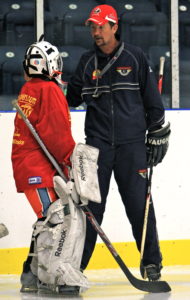
If I’d had a coach like Spencer had, I may too have given up and quit. My story would be completely different. In fact, I firmly believe I would have taken an entirely different path and not developed the instincts for survival that have allowed me to persevere and go after what I wanted. In fact, I am convinced I would not have survived at all….
The mother of Tommy, an eight-year-old at the time, told me of her son’s heart-wrenching experience in Atom.
He was told the other goalie was “number one,” and, conversely, he played just three of every ten games, including two very long stretches, one for five straight weeks, without ever playing in a single game. When he was finally given a start, the coach pulled him after less than four minutes of play, completely destroying any remaining confidence he had. Tommy was then was made to sit on the bench for the entire playoff run and was repeatedly told throughout the season, by the head coach “these games are too important for us to lose.”
When you tell any eight-year-old that the other goalie is #1 and the games are “too important to lose” (while you sit on the bench for weeks at a time) and then regularly pull him from the game, the message the child hears is “you suck and you aren’t part of this team.” This alienates the child and destroys team unity.
This is absolutely not the first time I have heard this same story from a goalie parent, and the fact this is allowed to happen at any level, let alone in an entry-level “competitive” Atom development league, is appalling. This coach had zero understanding of how his actions would affect the spirit and self-esteem of a once-enthusiastic young goalie who cried after every game.
Thankfully, this was six years ago, and Tommy is finally back to enjoying the game and having success at a higher level, but I know this experience has stayed with him for all these years, had an impact on his self-esteem, and negatively influenced his mindset for several years.
Not so many years ago I coached a young man in his mid-teens who was clearly on the verge of taking the wrong path. Hockey was his passion. His mother once told me that Ted (not his real name) wanted to be like me and earn a living in the game he loved – whether it be coaching or playing didn’t matter. Like me, he just loved the game.
His mother, a “rough around the edges” single parent, had good intentions and a heart of gold, but didn’t see the warning signs. There were many. I worked hard to understand Ted’s motivation and to keep him invested in the game. He became a valuable member of our team and loved the attention. Because I connected and communicated with him, I knew his goals and dreams, and I knew that hockey was his saving grace. He had an outstanding season.
The next year, he advanced to a higher level and struggled. The coach cared only about winning and did not take the time to find Ted’s motivation. He did not receive the attention he craved, and, as a result, he floundered and lost interest. He then found new avenues to amuse himself.
Two years later this young man was arrested and jailed for possession, trafficking, and gun-related charges. His life ruined, and his hockey-playing days are over. He is now a shell of the young man I knew. Long gone is the sparkle you could see in his eyes when he played the game he loved.
His new coach had never taken the time to learn about Ted as a person. The fact is, the swift decline in his life can definitely be correlated with his waning interest in hockey, which resulted from a lack of connection with a coach who never saw the incredible potential this young man had or took time to garner an understanding of Ted’s needs and desires surrounding the game.
While I’m sure this coach had good intentions, he failed to see the players as people with individual thoughts and challenges. One wonders – if he were to actually look back on Ted’s demise, would he see the connection to his coaching philosophy?

Spencer’s story is similar in that his misguided coach and, in this case, the entire organization, failed the young goalie who left the game he loved because of circumstances that simply should not be allowed to happen.
Spencer, like Tommy, was bullied because the coach created team division and allowed the bullying to happen. Before I go any further, let me be clear. Too many people are oversensitive, and there are many parents who use “bullying” as an excuse for their wimpy, overprotected kids who just need to mature and deal with life. But there are absolutely many instances where bullying is a serious threat to emotional stability and quality of life, and these situations need to be dealt with immediately.
Hockey is a sport where the culture is such that players verbally jab (chirp) each other quite often. It’s like a competition; the better the chirp and the more quickly it is delivered, the more popular the player who delivered it. The goalie is often the target of many chirps, and most develop a keen sense of timing and witty responses.
For the most part, this verbal banter is all in good fun, without malice or ill intent. It is as ingrained in the game as Don Cherry and stinky gloves. It becomes part of the camaraderie and players actually look forward to being part of it. This will continue as long as the game is played. If you haven’t experienced it, you simply won’t understand, but, believe me, it isn’t usually meant to cause pain or mental anguish.
Spencer, on the other hand, was dealing with legitimate mental abuse – bullying. This is completely unacceptable and something that cannot be tolerated. Coaches need to be in control of their players and aware of everything surrounding them. Mental abuse in the dressing room must be stopped and those responsible severely reprimanded. A failure to recognize or deal with such circumstances is a complete failure on the coach’s part.
Spencer’s mother spoke to the assistant coach about the abuse. Nothing was done, but Spencer found himself mysteriously sitting on the bench for all key games. Three months later, his parents told the head coach, who told the league president. The information never went any further, and the bullying continued.
The head coach opted to play the other goaltender in every key game for the remainder of the season, despite Spencer having a better GAA, save percentage, shutouts in 25% of his starts, and a far superior winning record, In fact, Spencer hadn’t lost a game in nearly three months, while the other goalie had lost his last five starts against the better teams in the league that Spencer was apparently not good enough to play against. All of this occurred without any communication or explanation.
The straw that broke the proverbial camel’s back was on a night when the other goalie was very sick and had missed practice due to illness that week. Spencer did the mature thing and asked his coach if he was starting so he could prepare for the game. The coach said he wasn’t sure. Then, he waited until the team was on the ice in warm-up before pointing at the other goaltender and stating “you’re in,” despite the fact he was still quite ill.
Spencer had had enough. He had won the previous meeting against this team and the other goalie was sick. He had lost all respect for the coach and the team structure. He was overwhelmed with emotion, and he quit the team on the spot. This is absolutely not the proper way to deal with frustration, and Spencer could have made a better decision.

As a side note, his team lost by a score of 7-2.
We have all been there, at a point where the breaking point of your emotions are so high that you can’t think straight. Imagine the emotional state of a teenager who just wants to play the game he loves. His stats prove he is equal to or better than his partner, and he is secretly battling emotional abuse from his own team and coach. What would you do?
The worst part is that Spencer has Ehlers-Danlos Syndrome, a connective tissue condition that will force him to quit hockey in a few years. Just as I kept my medical history a secret from everyone, Spencer has told no one of his condition. He simply wants to earn his spot and play. I can certainly appreciate this mindset, and I share his desire to be treated just like anyone else.
As his mother so eloquently put it: “All he wanted to do was play the game he loved. Never in my worst nightmare did I ever think that his own team and coach would force him to leave the game before his health gave out. I have cried every day since this happened. Spencer is essentially grieving the loss of hockey in his life and has shut everyone out, refusing to discuss the situation.”

I’ve seen this all too often in my 30 years of coaching. Spencer is now a powder keg waiting to explode. He has lost something that really mattered to him, and he now has no idea how to deal with it or express his feelings. I am concerned for Spencer’s safety and well-being.
A coach needs to be in tune with his players and address the hockey-related problems and situations that affect them. Emotions in sports run high, and Spencer was clearly distraught because of a team situation that got the better of him.
A good coach uses errors in judgment and sees these moments as teaching opportunities. Negatives can easily become positives when the opportunity is seized and the problem resolved.
The response from the league was incomprehensible. Within 24 hours, Spencer’s stats were removed from the league website and his name stricken from the team roster. His mother was told he was being denied his varsity letter, despite proof of eligibility. The family was told not to attend the (prepaid) team banquet.
Despite repeated requests by the parents to meet with the coach or board members, there was no reply. No one asked to speak with Spencer nor asked his parents what the issue was. The entire situation was ignored.

The coach and league clearly have their priorities in the wrong place and accept no accountability for the well-being and emotions of his goaltender, who had truly done nothing to deserve such treatment. The coach should, in fact, have been made to resign and prevented from ever coaching again.
Sadly, this story is not unique. It is, in fact, quite common, as are the countless political decisions that are made each hockey season with complete disregard for the emotions and well-being of young goaltenders.
Anyone within the game has experienced the politics that regularly turn young goalies into faceless pawns. To be fair, this happens at all positions and levels, but the goaltending position is much more susceptible, and the pain that much worse, because each team only carries two – and sometimes only one – goalie.
One of the worst offences is when “Dad the Coach” chooses his own undeserving goalie son or daughter, then cuts all others, eliminating goalie controversy and guaranteeing his own child will play every game.
Almost every goalie parent can reiterate a story of how “Dad‘ became a coach just so his child (a goaltender) could make the team or so he can then select his friend’s child for the team, cutting another young goalie who was far more deserving. Coincidentally, the other goalie’s father is often then named as an assistant coach.
I ask WHY is this allowed to happen?
Why are administrators and coaches not held to a standard that ensures fairness?
We will never eliminate the politics that surround minor sports; this is an impossibility when you are dealing with volunteers and parents who bring their own agendas to the position.
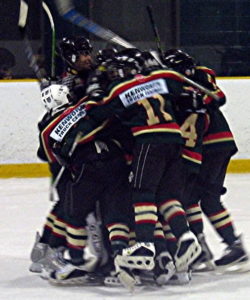
However, checks and balances are needed in every organization to ensure young goalies are treated fairly and with respect, and that their hard work and dedication, when present, is rewarded.
Make no mistake – kids will get cut, and playing times will never be perfectly equal. There will be disappointed children and parents, but this is part of the game and a life lesson we all need to accept. Coaches do make the final decision.
However, in making that decision, I am merely suggesting that these checks and balances be put in place to help control situations and deal with legitimate problems, such as bullying and personal agendas.
The true point of this article is summed up in a quote from my book Target Practice – 8 Mistakes That Ruin a Love of the Game. Former NHL Head Coach Wayne Maxner said to me “They (goaltenders) are human beings too; they want to be acknowledged and spoken to like anybody else.”
That says it all.
Take into consideration the feelings and potentially life-altering decisions you make as a leader of young men and women who simply want a fair chance to be rewarded for their efforts in an ethical and moral way.
Remember, the game may mean so much more to them than you can ever realize. You have the opportunity to enhance or destroy dreams. Make these decisions with heart, compassion, and consideration. Make them correctly and honestly. Don’t be afraid to make the right decision, but make it for the right reasons.
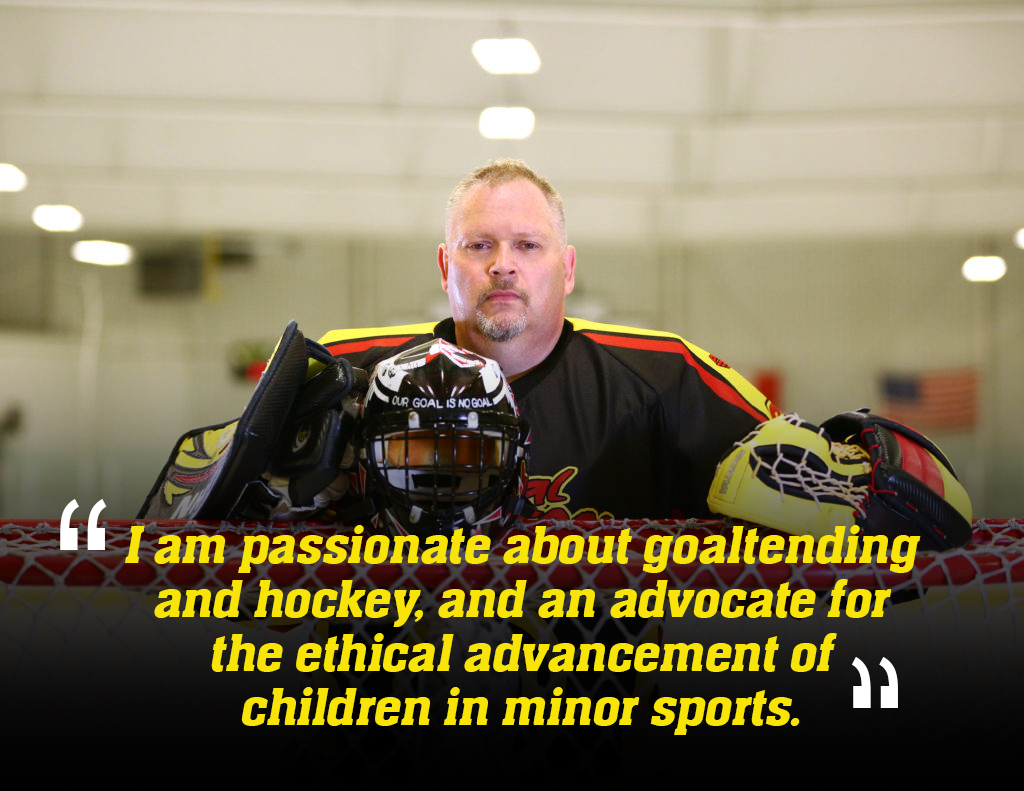
Chris Dyson is passionate about hockey. He is an advocate for the ethical advancement of children in minor sports and on a personal mission to improve grassroots hockey by positively affecting 50,000 goaltenders and coaches: helping children to love the game, learn life skills, and continue playing longer.
He believes enjoyment of the game for minor hockey-aged goaltenders (and players) is paramount, and that this can be achieved through the development of better coaching skills and the elimination of unnecessary negativity, which will inspire confidence through improved play. He is a man with vision and perseverance who understands adversity and the benefits of good coaches very well. Despite facing formidable odds and harbouring the improbable dream of a hockey career, he has thrived for over three decades as a professional goaltending coach. Born with a congenital heart defect, he spent much of his childhood in hospitals, experiencing major open-heart surgery, multiple pacemaker implants, an alcoholic mother, and a deadbeat dad who disappeared when things got tough. This included over 100 cardiac arrests in a single day – few people survived even one or two at that time. Dyson is a published author and professional goalie coach/consultant, coaching students from 19 countries through his company, Puckstoppers Goaltending Development. His biggest disappointment is seeing so many young goalies quit the game they love because of misdirection, improper coaching, and a lack of empathy. His critically acclaimed and bestselling book, Target Practice – 8 Mistakes That Ruin a Love of the Game, was written to help coaches and parents better understand the Essential Core Goaltending Skills (ECGSs). Dyson is the visionary behind the world’s first and premier online educational training and certification system, exclusively designed to assist coaches and parents in understanding how to work with and develop goaltenders effectively.
He has also created a series of free online resources

AUTHOR I GOALTENDING & EQUIPMENT CONSULTANT I SPEAKER
FOUNDER, PUCKSTOPPERS GOALTENDING DEVELOPMENT & ICOACHGOALIES.COM
